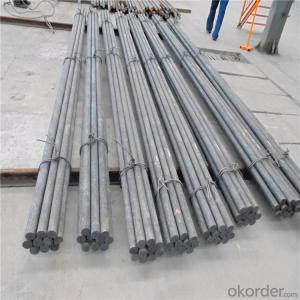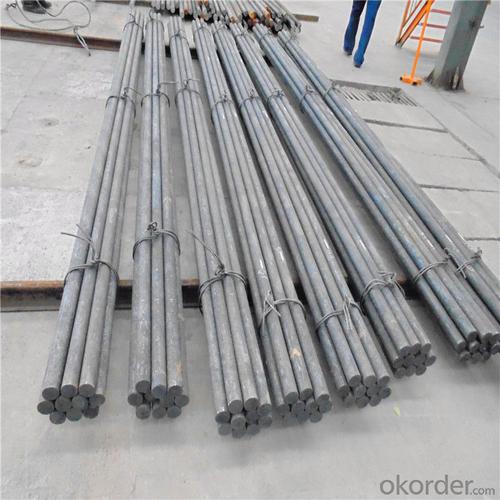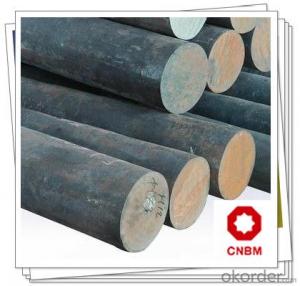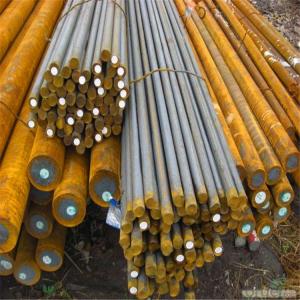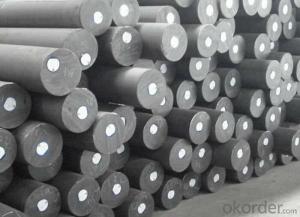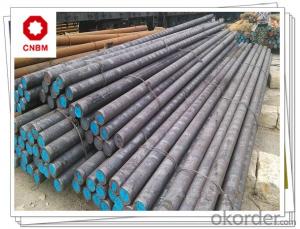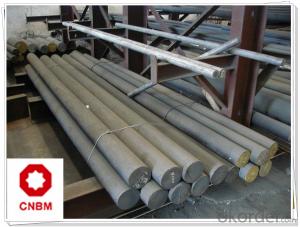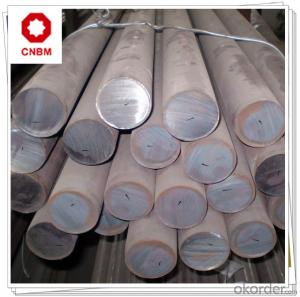Quality Hot Rolled Carbon Steel Round Bar S20C
- Loading Port:
- Tianjin
- Payment Terms:
- TT OR LC
- Min Order Qty:
- 100 m.t.
- Supply Capability:
- 500000 m.t./month
OKorder Service Pledge
OKorder Financial Service
You Might Also Like
Specification
Quality Hot Rolled Carbon Steel Round Bar S20C
Product Description of Quality Hot Rolled Carbon Steel Round Bar S20C
1. Steel grade: SAE1020, 20#, C22, S20C
2. Length: 6M-12M
3. Diameter: 16mm-300mm
4. Product range: round bar, flat bar, square bar
5. Technique: Hot rolled, forged, cold drawn
Specification of Quality Hot Rolled Carbon Steel Round Bar S20C
Material | S20C | Round bar | Dia(mm) | 16-300mm |
Process | EAF + LF + VD + Forged + Heat Treatment (optional) | Length (mm) | Max 12m | |
Heat treatment | Normalized / Annealed / Quenched / tempered | Flat bar | Thickness(mm) | 8-500mm |
Delivery condition | Hot forged +Rough machined (black surface after Q/T)+ Turned (optional) | Width(mm) | 70-200mm | |
Test | Ultrasonic test according to SEP 1921-84 D/d | Length (mm) | Max 12m |
Chemical Composition of Quality Hot Rolled Carbon Steel Round Bar S20C
C | Si | Mn | Cr | Ni | Cu |
0.17~0.23 | 0.17~0.37 | 0.35~0.65 | ≤0.25 | ≤0.30 | ≤0.25 |
Photo Show of Quality Hot Rolled Carbon Steel Round Bar S20C
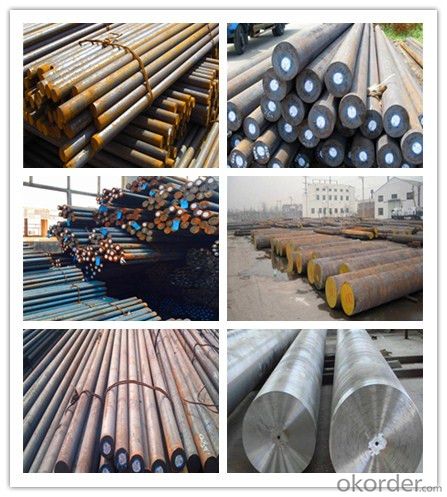
Packing and Delivery:
Packing in bundle package, or as customer's requirements.
Delivery Detail: 45 days after receiving the deposit.
Usage and Applications of Quality Hot Rolled Carbon Steel Round Bar S20C
1. Steel round bar is used in a large number of architectural and engineering structures. Or it can be used in construction of plants for the production of steel house frames, high-voltage transmission towers, bridges, vehicles, boilers, containers, ships, etc.
2. And we can use this kind of product on the performance of the mechanical parts if the demand is not very high.
3. Some special material steel round bar can be used for main shaft of steamer, hummer shank, with big section and supper force.
Company Information
CNBM International Corporation is the most important trading platform of CNBM group.
Whith its advantages, CNBM International are mainly concentrate on Cement, Glass, Iron and Steel, Ceramics industries and devotes herself for supplying high qulity series of refractories as well as technical consultancies and logistics solutions.


F A Q
1, Your advantages?
professional products inquiry, products knowledge train (for agents), smooth goods delivery, excellent customer solution proposale
2, Test & Certificate?
SGS test is available, customer inspection before shipping is welcome, third party inspection is no problem
3, Factory or Trading Company?
CNBM is a trading company but we have so many protocol factories and CNBM works as a trading department of these factories. Also CNBM is the holding company of many factories.
4, Payment Terms?
30% TT as deposit and 70% before delivery.
Irrevocable L/C at sight.
5, Trading Terms?
EXW, FOB, CIF, FFR, CNF
6, After-sale Service?
CNBM provides the services and support you need for every step of our cooperation. We're the business partner you can trust.
For any problem, please kindly contact us at any your convenient time.
We'll reply you in our first priority within 24 hours.
- Q: What are the advantages of using tool steel round bars?
- Tool steel round bars offer numerous benefits. Firstly, they boast outstanding hardness and wear resistance, making them perfect for high-stress applications like manufacturing cutting tools, dies, and molds. The hardness of tool steel also enables precise machining, resulting in accurate and intricate shapes. Secondly, tool steel round bars possess exceptional toughness and impact resistance, enabling them to withstand heavy-duty applications without breaking or cracking. This makes them suitable for demanding industries such as aerospace, automotive, and construction. Moreover, tool steel round bars are renowned for their high temperature resistance, maintaining their hardness and strength even in extreme heat. This is particularly advantageous in applications exposed to high temperatures, like forging or heat treating operations. Another advantage is the dimensional stability of tool steel round bars. They have a low coefficient of thermal expansion, meaning they undergo minimal dimensional changes when subjected to temperature variations. This ensures reliability and predictability in various operating conditions. Furthermore, tool steel round bars can be easily machined and heat treated to achieve specific properties. This versatility allows manufacturers to tailor the material to their specific needs, enhancing the overall performance of the end product. Additionally, tool steel round bars are readily available and cost-effective. They are widely produced and stocked by suppliers, ensuring easy accessibility for various applications. Furthermore, their longevity and resistance to wear and tear contribute to their cost-effectiveness. In conclusion, the advantages of using tool steel round bars include exceptional hardness, toughness, high temperature resistance, dimensional stability, versatility, availability, and cost-effectiveness. These properties make them the preferred choice in industries where durability, precision, and reliability are paramount.
- Q: Can steel round bars be used in the production of musical equipment?
- Yes, steel round bars can be used in the production of musical equipment. They can be utilized to create various components such as structural frames, supports, or even as part of the instrument itself. Steel is a versatile material known for its strength and durability, making it suitable for applications in the manufacturing of musical instruments.
- Q: How do steel round bars resist corrosion?
- Steel round bars resist corrosion due to the presence of a protective oxide layer on their surface, formed through the process of passivation. This oxide layer acts as a barrier, preventing the steel from coming into direct contact with corrosive substances, thereby inhibiting the oxidation reaction that leads to corrosion. Additionally, certain alloying elements, such as chromium, can be added to the steel composition to enhance its corrosion resistance properties.
- Q: What is the tolerance level for steel round bars?
- The tolerance level of steel round bars can vary based on multiple factors, including the bar's grade, diameter, and industry standards. Typically, the tolerance level is specified in terms of diameter or diameter deviation. For instance, in manufacturing, the tolerance level can be defined as a specific range of diameters, such as +/- 0.001 inches or +/- 0.02 millimeters. This means that the actual diameter should fall within this range to meet the tolerance requirements. Alternatively, the tolerance level can be expressed as diameter deviation, which measures the difference between the actual diameter and the specified nominal diameter. This deviation is often presented as a percentage or a specific measurement, like +/- 0.5% or +/- 0.010 inches. It is important to acknowledge that certain industries, like aerospace or automotive, may have stricter tolerance requirements due to the need for precision and quality. In these cases, the tolerance specifications might be narrower to ensure compliance with performance and safety standards. Ultimately, it is crucial to refer to relevant industry standards, specifications, or customer requirements to determine the specific tolerance level for steel round bars in a particular application.
- Q: Can steel round bars be used in the automotive manufacturing industry?
- Yes, steel round bars can be used in the automotive manufacturing industry. They are often utilized for various applications, such as the production of engine components, suspension systems, and structural parts. Steel round bars offer excellent strength, durability, and machinability, making them suitable for meeting the demanding requirements of the automotive industry.
- Q: How are steel round bars used in the construction of dams and reservoirs?
- Steel round bars are commonly used in the construction of dams and reservoirs for reinforcement purposes. These bars are typically embedded within the concrete structures to enhance their strength and durability. The steel round bars act as a framework, providing structural integrity and preventing cracks or deformations in the concrete. This reinforcement ensures that the dam or reservoir can withstand the immense pressure and load exerted by the water, making them an essential component in the construction process.
- Q: How strong are steel round bars compared to other materials?
- Steel round bars are known for their exceptional strength and durability, making them one of the strongest materials available. Compared to other materials such as aluminum, brass, and wood, steel round bars have a significantly higher tensile strength, which refers to the amount of pulling force a material can withstand without breaking. Steel round bars can also handle higher compressive loads, making them ideal for applications where heavy loads or pressure is involved. In addition to their high strength, steel round bars also exhibit excellent ductility, which means they can be easily shaped or bent without breaking. This characteristic makes steel round bars versatile and widely used in various industries such as construction, automotive, manufacturing, and aerospace. While other materials may have their own unique properties and applications, steel round bars remain a top choice when it comes to strength and reliability. Their ability to withstand high loads, resist deformation, and maintain structural integrity make them a popular choice for structural components, shafts, axles, and many other demanding applications.
- Q: Are steel round bars used in the automotive industry?
- Yes, steel round bars are commonly used in the automotive industry for various applications such as manufacturing components like axles, crankshafts, and suspension parts due to their high strength and durability.
- Q: How about the difference between round steel and shaped steel? Where are they mainly used?
- Section steel is a general term, round steel is a kind of section steel, mainly used in building structure, mostly for engineering steel.
- Q: What are the advantages of using steel round bars?
- Using steel round bars in various applications has several benefits. First and foremost, steel round bars are renowned for their exceptional strength and durability, making them perfect for construction projects as they can withstand heavy loads and provide structural integrity. Moreover, steel round bars exhibit excellent resistance to corrosion, making them suitable for outdoor and marine applications. They can endure harsh weather conditions and remain unaffected by moisture and chemicals, resulting in a longer lifespan and reduced maintenance costs. In terms of versatility, steel round bars offer a wide range of customization options, allowing them to be tailored to specific requirements. This makes them suitable for construction, manufacturing, and engineering projects where precise dimensions and specifications are crucial. Additionally, steel round bars have excellent machinability, making them easy to cut, drill, and shape. This adaptability saves time and effort during the fabrication process, making them highly convenient to work with. Moreover, steel round bars possess a high tensile strength, enabling them to resist deformation under pressure. This makes them an ideal choice for applications that require exceptional strength, such as in the manufacturing of machinery, tools, and automotive components. Lastly, steel round bars are cost-effective compared to other materials. Their durability and long lifespan result in reduced maintenance and replacement costs over time. Furthermore, their availability and widespread use make them a cost-efficient option for various industries. Overall, the advantages of using steel round bars include their exceptional strength, resistance to corrosion, versatility, machinability, high tensile strength, and cost-effectiveness. These qualities contribute to their widespread usage in industries worldwide.
Send your message to us
Quality Hot Rolled Carbon Steel Round Bar S20C
- Loading Port:
- Tianjin
- Payment Terms:
- TT OR LC
- Min Order Qty:
- 100 m.t.
- Supply Capability:
- 500000 m.t./month
OKorder Service Pledge
OKorder Financial Service
Similar products
Hot products
Hot Searches
Related keywords
